Text

This was a really special night at the Grolier Poetry Book Shop, reading with the lyrical virtuoso Tongo Eisen-Martin (introduced by Keith Jones). Leading up to the photo I said, omg, I am so short! Tongo joked he could bend down for the photo. Even with him leaning forward the gap is still hilariously large.
Lil person, big voice. Shoutout to shortie poets everywhere
8 notes
·
View notes
Text
notes on the singing world
youtube
This morning I sat outside on my back porch, drinking my coffee at 7:30am, soaking up the early sun. There was peace in my heart, a peace I wish I could give to everyone in the world. We still don’t know the source of it. I listened to a live recording of the Brazilian singer Gal Costa singing “Baby”—“Você precisa saber da piscina, Da margarina, da Carolina, da gasolina...” The crowd roars with those opening lyrics. You can hear the whole audience singing along, “Baby, baby, I love you...” I wept some tears of joy and wrote in my notebook, “You know, when I die, I will be sad to leave the world behind. I loved this broken world, I loved it truly.”
Then I read a journal entry from a week ago:
April 13
Today the sky went from sunny to gray sunny to gray. Stepped out of my house, into the blustery air—two pigeons were perched above the commuter rail, their iridescent throats catching the spring sun. Turning down Oxford Street, Kimya Dawson came on over my headphones. I haven’t thought of Kimya Dawson in nearly 20 years, I thought, and was flooded with memories of high school, teenage emotion, so embarrassingly earnest. Once I left a comment on Kimya’s livejournal: “I couldn’t get a ticket to your show...” She put me on the guest list, how sweet of her. “And the road’s still long but you come along...”
I felt calm. Thought: so this is the calm that follows a long cry. The whole world and its kaleidoscopic array of details were singing to me: the white petals of the star magnolia aloft on the wind, a stranger’s purple sari blowing in the breeze as she crosses the street, the tuxedo cat sitting in the periwinkles, pink saucer magnolia blooms above some blue graffiti, observed through a chain link fence.

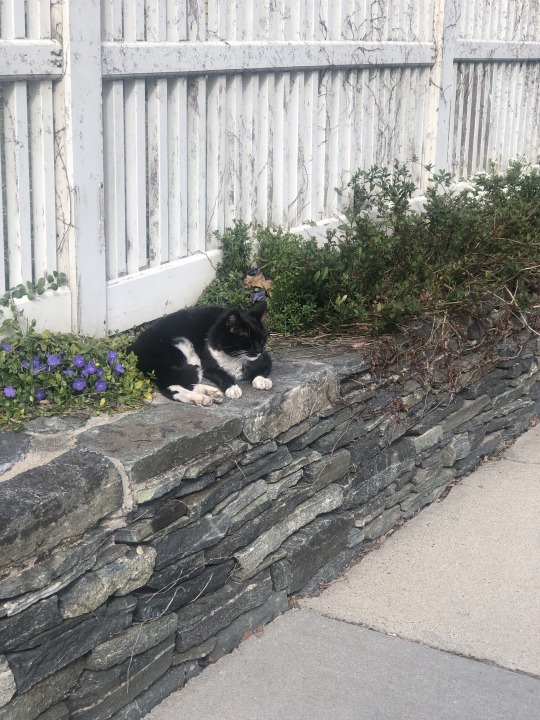
I walk to the Charles River and sit on a bench watching the daffodils lining the bank of the river dance in the wind while the sparkling light on the surface of the water twinkles in the background. Once Bhanu Kapil and I sat by this river admiring the daffodils. At sunset we sat with our eyes closed, doing a sun meditation before we walked over to the Houghton Library for her reading with Fred Moten. We wandered around the Harvard campus and she posted a photo of me on her blog doing a peace sign in the Harvard Math Department. On the counter next to the Keurig coffee maker, Ed made an intricate mandala out of sugar packets and wood coffee stirrers. She made a joke about Indians and Russians both loving chess and mathematics.
Drifting in and out of memories. I observe an old man in a beret taking photos with his vintage medium format camera of the daffodils and the river. He says Hello. I smile and say Hello. A woman is on a blanket in the grass, photographing her dog rolling around on its back.
I wander around Harvard Square. Through the window of Tasty Burger I see a young black woman and white man (probably undergrads) acting playfully as they eat. She sticks her tongue out. He taps it with his finger. They do this over and over. I go into Harvard Book Store, leaf through some books, and buy a copy of Amelia Rosselli’s Sleep. So many words. I wonder about the books I will write, the people who are on the other end of that strange relationship, the relationship between writer and reader.
I used to have a dragnet mind, used to walk around in a state of pure awe, my window of perception so wide—it was the world, simple, resplendent, endlessly offering itself to me. I humbly accepted it, that gift of quotidian grace. Ordinary things glowed with a freshness that brought tears to my eyes. It’s rarer now, but still, I cherish the days when I can feel the world singing to me.
The world. Tell them—tell them, she loved it truly.
4 notes
·
View notes
Text
St. John of the Cross on the recklessness of love

But when once the flame has enkindled the soul, it is wont to conceive, together with the estimation that it already has for God, such power and energy, and such yearning for Him, when He communicates to it the heat of love, that, with great boldness, it disregards every-thing and ceases to pay respect to anything, such are the power and the inebriation of love and desire. It regards not what it does, for it would do strange and unusual things in whatever way and manner may present themselves, if thereby its soul might find Him Whom it loves.
6. It was for this reason that Mary Magdalene, though as greatly concerned for her own appearance as she was aforetime, took no heed of the multitude of men who were at the feast, whether they were of little or of great importance; neither did she consider that it was not seemly, and that it looked ill, to go and weep and shed tears among the guests, provided that, without delaying an hour or waiting for another time and season, she could reach Him for love of Whom her soul was already wounded and enkindled. And such is the inebriating power and the boldness of love, that, though she knew her Beloved to be enclosed in the sepulchre by the great sealed stone, and surrounded by soldiers who were guarding Him lest His disciples should steal Him away, she allowed none of these things to impede her, but went before daybreak with the ointments to anoint Him.
7. And finally, this inebriating power and yearning of love caused her to ask one whom she believed to be a gardener and to have stolen Him away from the sepulchre, to tell her, if he had taken Him, where he had laid Him, that she might take Him away; considering not that such a question, according to independent judgment and reason, was foolish; for it was evident that, if the other had stolen Him, he would not say so, still less would he allow Him to be taken away. It is a characteristic of the power and vehemence of love that all things seem possible to it, and it believes all men to be of the same mind as itself. For it thinks that there is naught wherein one may be employed, or which one may seek, save that which it seeks itself and that which it loves; and it believes that there is naught else to be desired, and naught wherein it may be employed, save that one thing, which is pursued by all. For this reason, when the Bride went out to seek her Beloved, through streets and squares, thinking that all others were doing the same, she begged them that, if they found Him, they would speak to Him and say that she was pining for love of Him. Such was the power of the love of this Mary that she thought that, if the gardener would tell her where he had hidden Him, she would go and take Him away, however difficult it might be made for her.
8. Of this manner, then, are the yearnings of love whereof this soul becomes conscious when it has made some progress in this spiritual purgation. For it rises up by night (that is, in this purgative darkness) according to the affections of the will. And with the yearnings and vehemence of the lioness or the she-bear going to seek her cubs when they have been taken away from her and she finds them not, does this wounded soul go forth to seek its God. For, being in darkness, it feels itself to be without Him and to be dying of love for Him. And this is that impatient love wherein the soul cannot long subsist without gaining its desire or dying.
—St. John of the Cross, Dark Night of the Soul
#St. John of the Cross#love#love theory#christian mysticism#mysticism#christianity#theology#Dark Night of the Soul#Juan de la Cruz#literature#Mary Magdalene
13 notes
·
View notes
Text
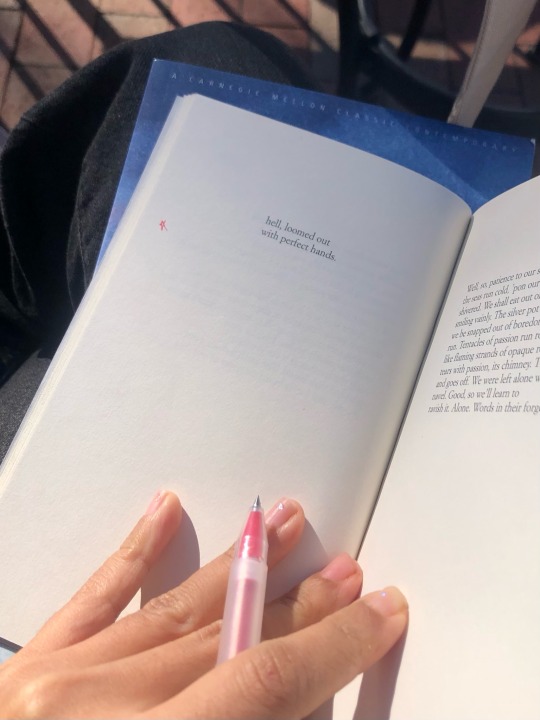
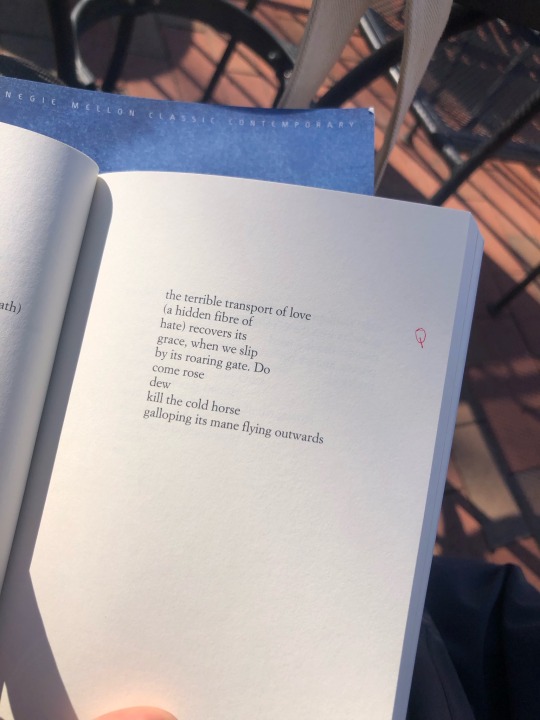
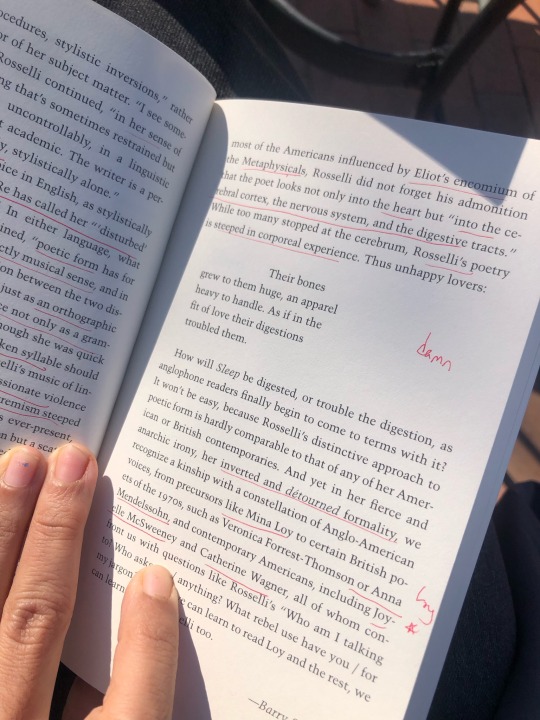

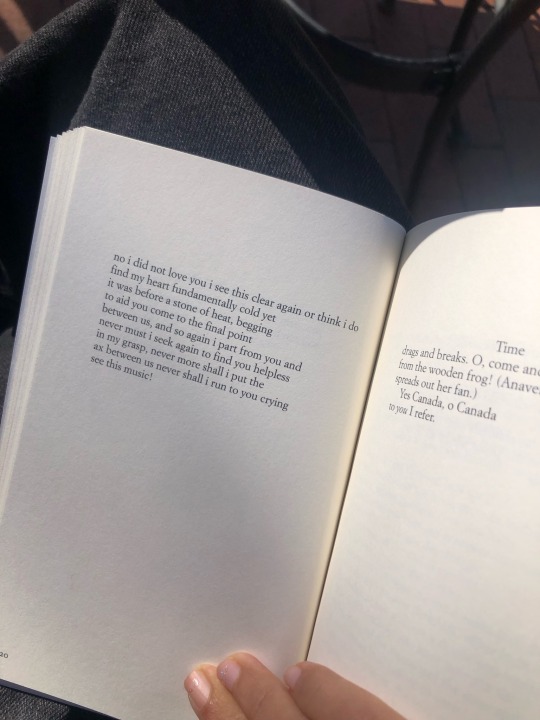
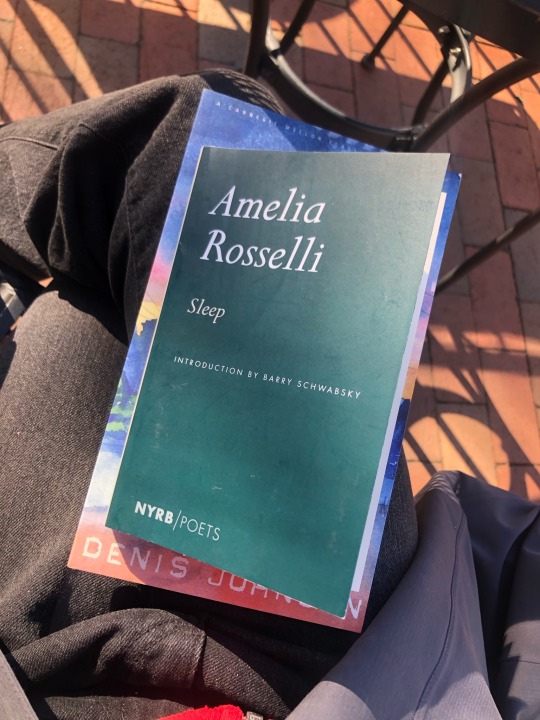
Digging into the English-language poems of Amelia Rosselli. It’s dark and disturbed like her Italian-language poems, but in a totally defamiliarized and often archaic English.
“the terrible transport of love / (a hidden fibre of / hate)”
12 notes
·
View notes
Text
Images Festival

Tomorrow, at 12pm in Toronto, after a screening of Mohammad Malas's film The Dream, I will be in conversation with Palestinian curator and writer Nasrin Himada.
Buy tickets for the screening here.
The Dream, a film by Mohammad Malas, is filmed in the Palestinian refugee camps of Sabra and Shatila, shortly before the massacre of 1982. Malas’s documentary focuses on dreams and dreaming by documenting Palestinians recounting their dreams. In this way, the film plays on a double register, whereby Palestinians recall the reality of their everyday lives transposed into their dreams, nightmares, and premonitions. Ultimately, these dreams tell the story of longing for our land: the dreams make the light. Malas is a prolific filmmaker, working in art, fiction, and documentary. After teaching philosophy at Damascus University in the 1960s, he turned to film and has since produced numerous award-winning works, notably a series of powerful documentaries on political prisoners in the Arab world. He has also published novels and writes frequently on Arab cinema.
10 notes
·
View notes
Text
dispatch from the void

Above: A voice memo on M's death anniversary, in which I describe my encounter with a stranger on the French King Bridge. Stranger, I will never forget you. There really are angels out there in the world.
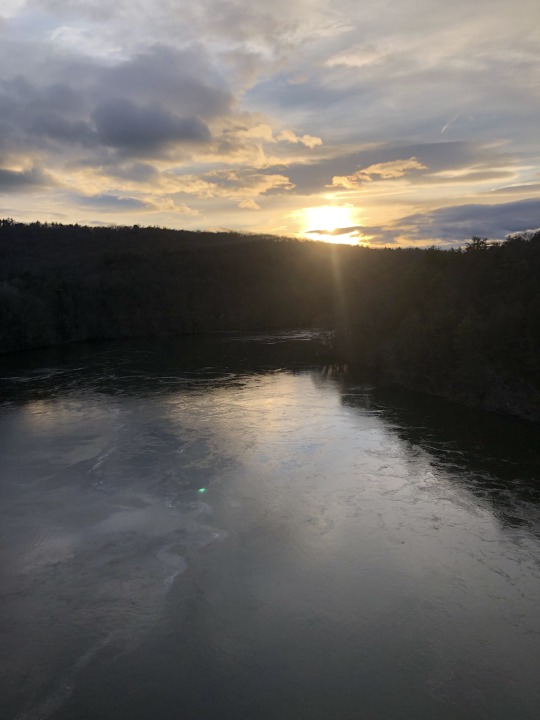
7 notes
·
View notes
Text
"The Disinherited" by Gérard de Nerval
I am the dark one,—the widower,—the unconsoled,
The prince of Aquitaine at his stricken tower:
My sole star is dead,—and my constellated lute
Bears the black sun of the Melencolia.
In the night of the tomb, you who consoled me,
Give me back Mount Posilipo and the Italian sea,
The flower which pleased so my desolate heart,
And the trellis where the grape vine unites with the rose.
Am I Amor or Phoebus?…Lusignan or Biron?
My forehead is still red from the kiss of the queen;
I have dreamed in the grotto where the mermaid swims…
And two times victorious I have crossed the Acheron:
Modulating turn by turn on the lyre of Orpheus
The sighs of the saint and the cries of the fay.
Translated by Robert Duncan
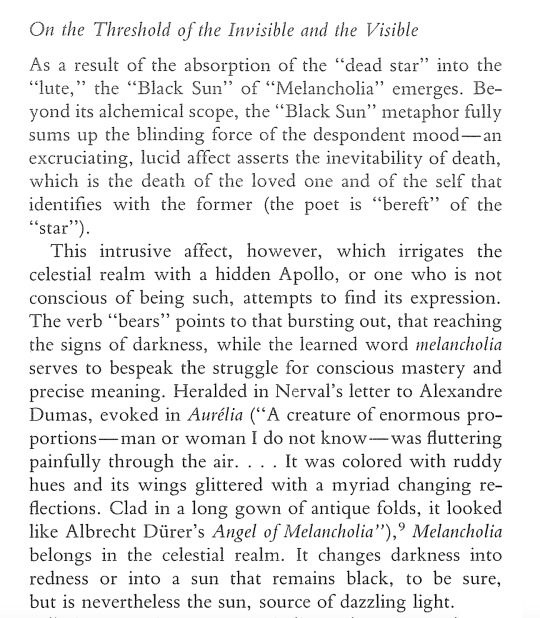
--Julia Kristeva, Black Sun: Depression and Melancholia
#Gérard de Nerval#literature#poetry#julia kristeva#kristeva#Robert duncan#black sun#melancholia#eclipse#death#psychoanalysis#depression#sun
5 notes
·
View notes
Text
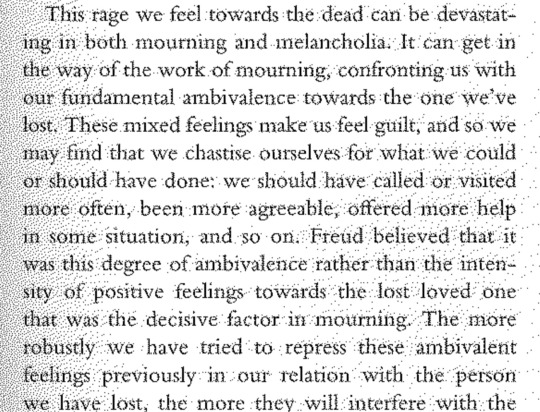
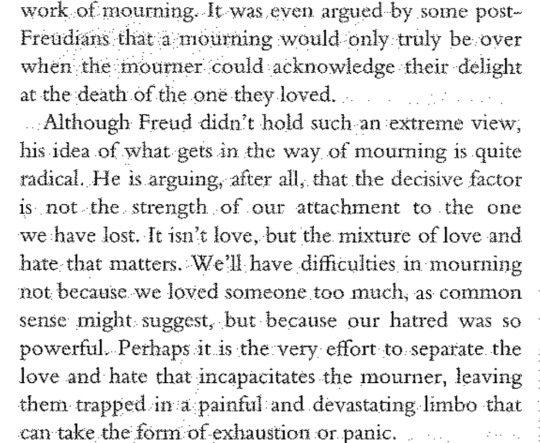
--Darian Leader, The New Black: Mourning, Melancholia, and Depression
Remember: it is ambivalence--not fierce attachment--that complicates and protracts the process of mourning, leaving the bereaved in limbo, forever tethered to a lost object by an unassimilable hatred and its attendant guilt.
#psychoanalysis#sigmund freud#freud#Darian Leader#mourning#melancholia#literature#mourning and melancholia#death#hatred#guilt#ambivalence#hate
14 notes
·
View notes
Text
Here’s a podcast I recorded recently with Andrew Felsher from 128 Lit: https://www.128lit.org/a-cosmic-talk
You can also listen to it on Spotify here:
Or watch it on YouTube here:
youtube
4 notes
·
View notes
Text
W.G. Sebald on the solar eclipse of 1502

(The Isenheim Altarpiece by Nikolaus of Haguenau and Matthias Grünewald, 1512–1516)
on the first of October the moon’s shadow
slid over Eastern Europe from Mecklenburg
over Bohemia and the Lausitz to southern Poland,
and Grünewald, who repeatedly was in touch
with the Aschaffenburg Court Astrologer Johann
Indagine,
will have travelled to see this event of the century,
awaited with great terror, the eclipse of the sun,
so will have become a witness to
the secret sickening away of the world,
in which a phantasmal encroachment of dusk
in the midst of daytime like a fainting fit
poured through the vault of the sky,
while over the banks of mist and the cold
heavy blues of the clouds
a fiery red arose, and colors
such as his eyes had not known
radiantly wandered about, never again to be
driven out of the painter’s memory.
These colors unfold as the reverse of
the spectrum in a different consistency
of the air, whose deoxygenated void
in the gasping breath of the figures
on the central Isenheim panel is enough
to portend our death by asphyxiation; after which
comes the mountain landscape of weeping
in which Grünewald with a pathetic gaze
into the future has prefigured
a planet utterly strange, chalk-colored
behind the blackish-blue river.
19 notes
·
View notes
Text
FIRST TOTAL SOLAR ECLIPSE
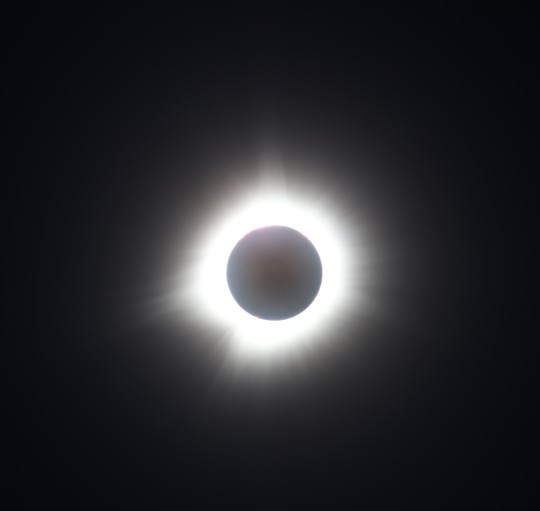
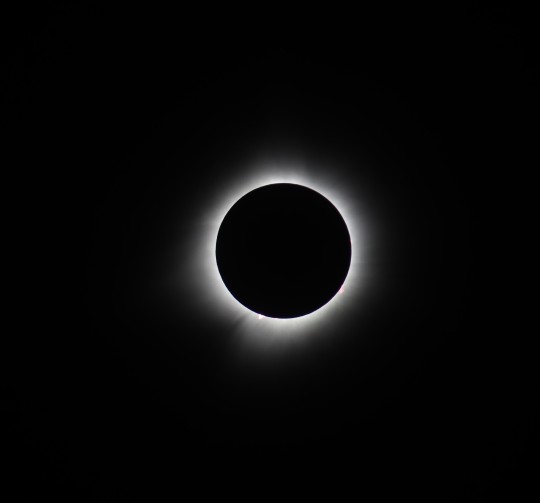
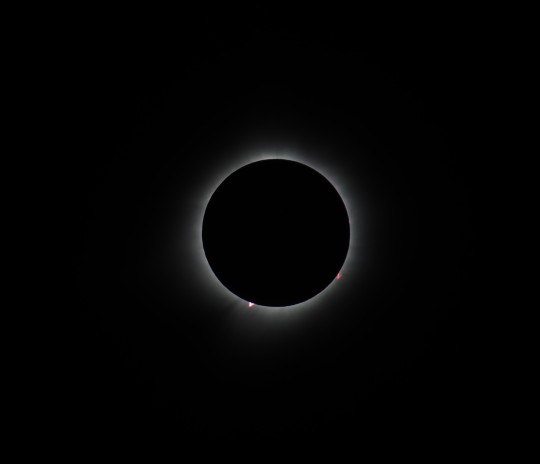
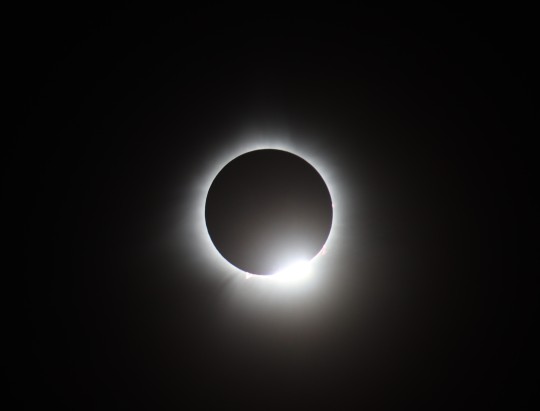
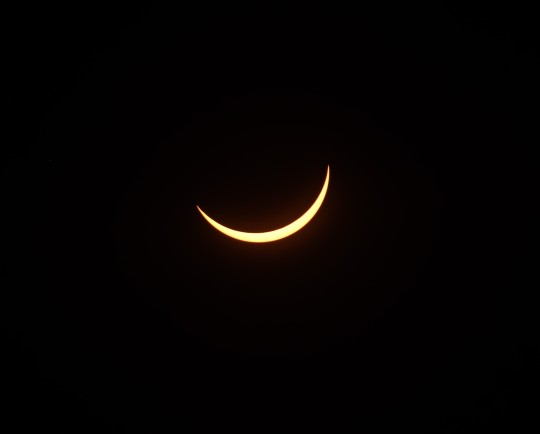
Images from my first total solar eclipse, depicting the outer corona, inner corona, prominent prominences, diamond ring, and the partial phase. Photos taken by Dan.
A black sun. Never had I seen a black sun, that insignia of melancholia that will forever remind me of Kristeva, which will forever remind me of M’s suicide—it was one of the few books M had with her at the very end, the book that her mother believed was the key to why she did it.
Black sun. On the day of—or day after—M’s death anniversary. I had been weeping for days when I found myself beneath that darkening sky.
*
What’s the difference between a partial and a total eclipse? I vaguely remember going onto the playground with some glasses as a child, but I don’t remember what I saw in the sky. What’s the big deal? The sky goes dark for a few minutes. It can’t be much different from the onset of night.
Wrong.
The rhapsodic scientists I listened to on various podcasts convinced me that there is really no comparison between a partial and total eclipse. I tried to hatch a last-minute plan to get myself in the path of totality. In the days leading up to the eclipse, I would be at the French King Bridge for M’s death anniversary. The only person I knew in Western MA, besides M’s mother, was my poet friend Ethan. So I asked him if he had a plan to see the eclipse.
I did not know, when I texted him out of the blue, that his parents lived in the path of totality in northern Vermont, that his father Dan was an astronomer (communist astronomer!) and eclipse chaser (this was his 14th eclipse), that Dan had even organized the local viewing event and wrote a book on the history of astronomy. At Ethan’s parents’ house there were literally photographs of eclipses mixed in with the family photos (see below). His father had even built a little observatory on his land. I had, in the most haphazard fashion, found the perfect guide to my first total solar eclipse.
Dan brought his equipment to the eclipse viewing: cameras, filters, binoculars, and a $4000 hydrogen alpha telescope that we used before the eclipse to look at the sun’s prominences and a sunspot on the surface. He enthusiastically answered all my questions. How had the Babylonians worked it out so long ago? Why does the wind pick up when the eclipse begins? Why is the sun’s corona so much hotter than the sun’s surface? (It’s still a mystery to the scientists…) Why why why. (People often tell me that I always ask a lot of questions—almost like an eternally curious child.)
The eclipse. It is not like the dimming of sunset, with its orange hues and plunge into the horizon, the low angle. It is a light unlike any light I have seen before, a strange dream-like atmosphere, a gray yet shimmering unreality, the air suddenly cold, the birds in a confused tumult. The uneven temperature of the atmosphere makes the wind pick up as the moon slowly covers the sun. Though the light was not the gold of sunset, you could see a band of orange on every horizon like a 360 degree sunset, an eerie gloaming that electrifies your skin.
A silence descended on the field as the moment of totality approached. Then, audible gasps—we couldn’t believe what we were seeing. I think the first thing I said was, “Holy. Shit.” Nothing prepared me for the numinous beauty of the sun’s corona, those elegant wisps of bright white light haloing the black sun. I think it’s probably the closest one can come to seeing God while alive on this earth. I cried during totality while observing the patterns in the corona through binoculars. A beautiful pink arch of plasma (a prominence) was visible toward the bottom of the sun. Dan pointed out Venus in the sky.
In the center of that black hole
there is an abyssal silence
I don’t know how to describe it. Celestial indifference to human endeavor, human emotion. A kind of coldness in that heat, the heat of the corona, beyond even the fires of Hell. Then I can hear the angelic squall of the corona ringing over the landscape. It is a sound full of grace even as it cannot be called happy.
I can see why the ancients might interpret an eclipse as an augur of something deeply ominous, perhaps apocalyptic. The experience is, at once, sublime, ecstatic, and deeply unnerving—all your perceptual faculties are telling you that something is wrong. The ongoingness of the world and its rules cannot be taken for granted, for the sun went black, not in my dream, but in the afternoon sky.
And just as soon as it began, it was over. We had almost 3 and half minutes of totality. I was surprised by how quickly the sky brightened, how much light we get when the sun is almost completely covered.
One day the moon will float away. There won’t be any more total solar eclipses. Be grateful you were alive during this slice of cosmic time.
youtube
This is my favorite scene in all of cinema, from Béla Tarr's Werckmeister Harmonies. Watch drunkards reenact an eclipse in a drab Hungarian bar...

Ethan and communist astronomer dad!
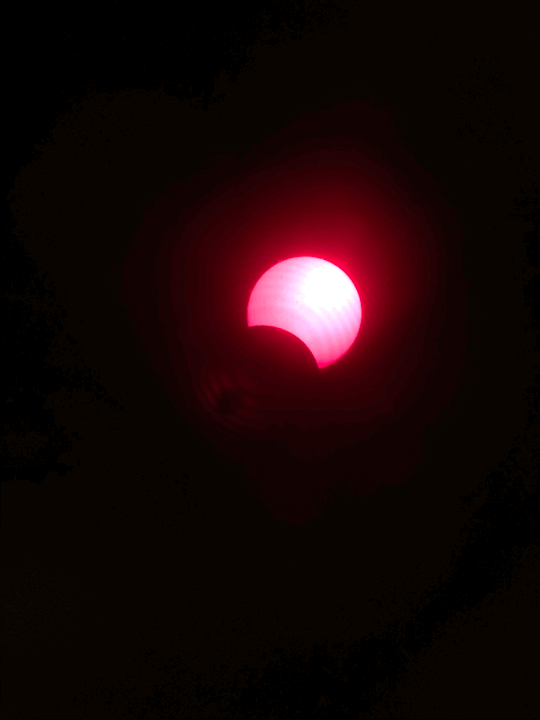


I even got eclipse-branded maple syrup (peak Vermont)

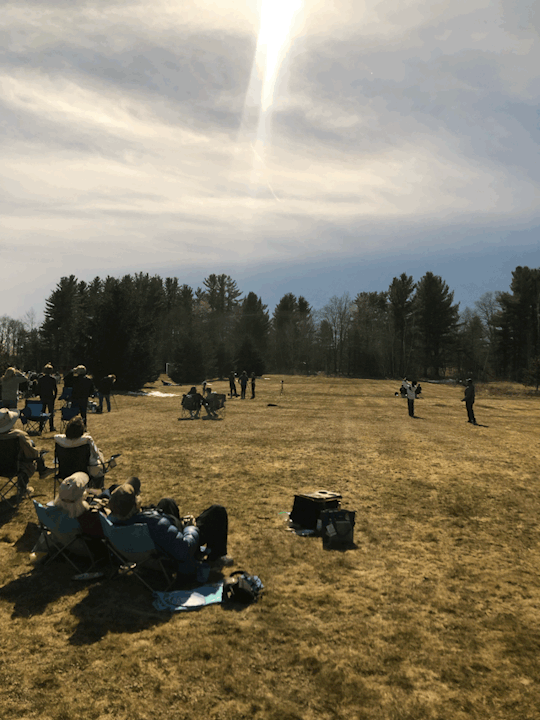

#eclipse2024#eclipse#total solar eclipse#solar eclipse#Werckmeister Harmonies#film#bela tarr#great american eclipse#béla tarr
35 notes
·
View notes
Text

These students have been through absolute hell. And yet they are not cowed, even after the wrath of the global elite/Zionist bully machine has come down on them with full force for trying to stop a genocide. I’m so moved by that steadfastness.
6 notes
·
View notes
Text
some notes on sufism

The other day I went to the Harvard Divinity School Muslims iftar (the meal that breaks the fast during Ramadan), which was followed by a concert of Turkish music that is traditionally performed in Sufi lodges in Istambul. Before the music began, the professor I’ve been auditing Islamic literature classes with read some verses from Rumi’s Masnavi and offered a meditation on fasting through an interpretation of the lines: “If you have closed this mouth, another mouth is opened, which becomes an eater of the morsels of mysteries.” That is the nature of mystical knowledge—gnosis (or maʿrifa) is not understood intellectually, but tasted (dhawq). The closing of the bodily mouth is an opening of the spiritual mouth. He asked us to listen to the music with the inner heart.
I went with my friend S, who has been nudging me toward conversion. I’ve been allergic to religion most of my life because I’m not really much of a joiner. I distinctly remember being in (Catholic) Sunday School as a child and thinking to myself: This sounds fake to me. As in, made-up, irrational. The people who treated the fanciful stories like fact seemed like crackpots to me, even to my child-mind. I don’t think I ever believed in Santa either—I guess my disposition was innately skeptical; perhaps that contributed to my identification with anarchism from when I was 13 or 14. Yet at the same time, my feeling for the invisible, for the world of the dead, was always quite strong, even when it was unstitched from a belief system. As a kid I would wander the house alone at night, thinking I could hear my dead parakeet chirping from a shoebox in the garage.
I hated Sunday School. While I was always good at school-school (at least when I was a child, before I became an incorrigible truant), I was terrible at Sunday School. Because it seemed like hocus-pocus to me, none of it stuck. My classmates had internalized all the stories I thought were outlandish. During mass I would think exclusively about donuts, the ones we would buy from the ladies who would sell them as a fundraiser. I’ve thought about returning to Catholicism, but sadly, after the post-1970s political realignment in the US, all the leftist Catholics (the Marxists who loathed the Vietnam War and exposed the FBI’s COINTELPRO) are gone. As much as I love reading Catholic mystics (St Teresa of Avila, St John of the Cross, Angela of Foligno, Hildegard of Bingen, Meister Eckhart, Marguerite Porete, and others), Christian mysticism is more individualist than Islamic mysticism—asceticism and separation from the group is the way to commune with God, while Islamic mysticism is rooted in communal practices like sama (singing, dancing, reciting poetry, playing/listening to music) and dhikr (communal prayer for the remembrance of God). While Christian mysticism bears the imprint of the Neoplatonist trajectory of ascent, for Sufism, the trajectory is shaped like a paisley. After fana (annihilation of the ego/union with God/dying before you die), there is baqaa or subsistence, a return of sorts.
I also much prefer the Islamic orientation to the created world than the Christian one, for in Islam, everything in creation can be understood as the breath or speech of God. The Hadith on which Sufi cosmology is based reads, “I was a hidden Treasure and Loved to be known, so I created the world that I might be known.” All of creation is a mirror to reflect God (this is why you must polish the rust from your heart, for the human heart can manifest all the names and qualities of God). In the Islamic mystical tradition there is an affirmation of the created world even though God and creation are not the same (as is the case in Pantheism). Everything has ontology. Nothing has ontology. The Sufi metaphysicians ask us to see with two eyes. The drop is not the ocean at the same time it cannot be separated from the ocean.
7 years ago I read Reza Aslan’s God: A Human History. After sampling the platter of world religions I joked to myself, Hmmm, if I had to pick the one I vibe with most, I guess it would be Sufism (Islamic mysticism). I didn’t know anything about Sufism other than the Rumi and Hafez poetry I read as a teenager, but the way Aslan described Ibn ‘Arabi’s concept of 'wahadat al-wujud' (or Unity of Being) reminded me of Spinozism. I guess what I’m trying to say is...I just think Sufi metaphysics is...right. Or, it speaks to how I tend to think about reality. It’s not something I can prove (that I don’t exist, while at the same time I am part of the ALL that is God), but it makes the most sense to me.
In the Sufi literature class, S jokes to me: “You’re the only non-Muslim in this class.” The same was probably true at the iftar + concert. S points to someone from the class: “The Maoist is a recent convert. This is their first time fasting for Ramadan.” “Is [our professor] fasting?” “Of course. I saw him at the iftar last night and talked to him about translation. I told him it’s ghastly to try to fit Persian verse into an English rhyme scheme. He agreed with me.” (We are clearly partisans of blank verse translations… yet so much of what’s out there has been poorly translated or not translated at all.)
Much of the lyrics sung with the gorgeous music were verses written by the great Turkish-language Sufi poet and mystic Yunus Emre ("the Dante of Turkey," I whispered to S). S was ecstatic listening to the haunting ney (a kind of flute). We just so happened to be sitting in the same row as the professor. I tapped S and whispered that it looked like he was really enjoying the music. He was smiling with his eyes closed and swaying his head from side to side. He looked like he was having...a profound experience. This prof usually has what I guess you’d call ‘resting bitch face’ (which I always found funny because it runs counter to his sweet and gentle personality). But not at the concert. Pure bliss was painted on his face. It was then that it dawned on me that Sufism, for him, was probably something more than a scholarly interest. I thought about what it must have been like to discover something so beautiful and profound, and to know, in that moment, that your life will be changed forever—you might go off to Iran and devote your entire life to studying medieval texts.
Of course this Ramadan I am thinking continuously about the genocide in Gaza, how an entire population is being starved to death by the sadistic leaders of Israel, how terrible it must be to be bombed and shot at during the holy month, or to break your fast with boiled grass and animal feed. I feel truly ashamed to come from a country that is complicit in this violence. I hope everyone continues to apply pressure to end this war—it feels hopeless now, but it is making a difference.
15 notes
·
View notes
Text
Yi Yi by Edward Yang

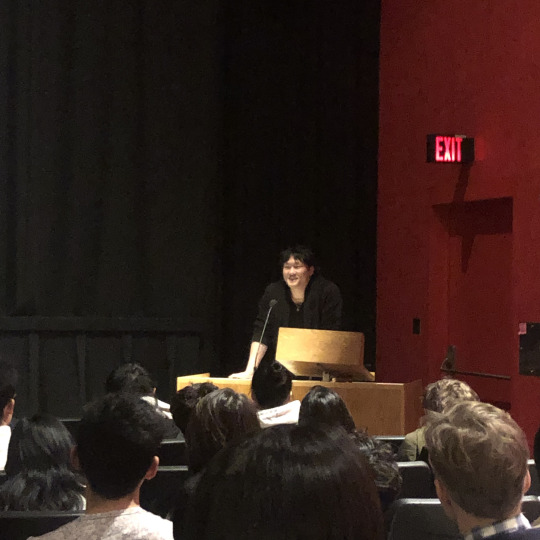
Kaili Peng (wife of Yang) + Haden Guest, Sean Yang (son)
This film has been on my watchlist for ages. When I saw the Harvard Film Archive was doing an Edward Yang retrospective, I waited to watch a glorious 35 mm print. The film was introduced by Yang's wife, pianist Kaili Peng, and son, Sean Yang. Sean spoke of his father's early death, about only getting to know his dad through his films. After the screening Kaili describe Yi Yi as a "prelude to his own passing," his last "love letter to the world." She described Yang as a moody and passionate person, prone to bouts of anger. Yet while making Yi Yi, he was always in a good mood--that "sweetness" (her word) is captured in the tone of the film.
Why is it that the films of the Taiwan New Cinema + Second New Wave (especially Tsai Ming-liang) capture urban alienation so powerfully? What is the root of this melancholia? You'd think Taipei was the loneliest place in the world. I don't know. Maybe it is. I've never been, even though my father immigrated from Taiwan and I've long wanted to go there to scatter my grandfather's ashes.
Yi Yi contains sadness and levity in equal measure. In that sense it is true to life. The adult characters are haunted by their disappointments. Min-Min is plagued by a lack of meaning she tries to counter with Buddhist retreats. NJ is troubled by the counterfactuals of his life—the career he did not pursue, the great love he abandoned, who he encounters 30 years later. The children repeat the disappointments of their parents, continuing the cycle, ad infinitum. Strange, the night before watching Yi Yi, I watched Abbas Kiarostami's Where Is the Friend's House?. Both films stage an encounter between a child and an elderly person as a way to meditate on life and time. In both films there is affinity between the child and old person, who exist on the outer edges of the life cycle. Yes, you can't help but feel, watching Yi Yi, that the little boy Yang-Yang is an old soul (see the films final lines). Yang-Yang is the film's comic relief. I love what that boy sees—the photographs he takes of the backs of people's heads, how I dreamed them (see the photos that open my Sunflower book).
Ting-Ting, too, is beautiful in her loneliness. Her guilt, her insomnia. She dreams of relief: "Now that you've forgiven me, I can sleep."
How am I supposed to address the dying? Every soliloquy to the comatose grandma is the character confronting themselves. NJ mumbles that speaking to someone in a coma is like praying. Do they hear you? Are your words sincere?
The way the film is shot, too, adds to the feeling that the characters are self-enclosed. Much of the action takes place in cramped interiors. The camera is often placed outside the building or train, just beyond the windows, giving you the feeling the they are ensheathed by glass. The window becomes a nexus between the interior and exterior: in the glass we can see what is happening outside at the same time we are observing the facial expressions of the characters. The headlights of the nighttime traffic dance on a woman's face. This is truly the hand of a director with a powerful vision.
Kaili said, after the screening, that Edward's autobiography is manifest in many of the characters. Edward was turned down from piano lessons, as was NJ. The music only meant something to him after the first time he fell in love.
What can I say. It's a beautiful film. Watch it.
[Read more film reviews on my Letterboxd.]
6 notes
·
View notes
Text

Boston/Cambridge MA alert! Come to this reading at the Grolier Poetry Book Shop in Harvard Square.
Tongo Eisen-Martin and Jackie Wang with an introduction by Keith Jones
April 18, 2024
7:00 PM
In-person sign up: https://lp.constantcontactpages.com/ev/reg/x8wgjph/lp/ccaaa417-6464-433b-b8d6-1f87864af42f
Virtual sign up: https://lp.constantcontactpages.com/ev/reg/w7ddwrs/lp/fc19c651-bb7e-47f9-a2f2-b1e6a5d13f47
2 notes
·
View notes
Text
A year and three days ago. I am in Portland again, still thinking about the last words of dying people. In all of the fragments above there is a dissolution into infinity (hundreds of ships, scattering butterflies, the infinity of lemonade). It’s like the dying person is experiencing themselves breaking up into little bits—the bounded days fraying as we are finally wrecked by the centrifugal force of time.
I sit beneath the same blossoming cherry tree I sat beneath a year ago, reading poetry. Look up at the bees, the crows are sent aflight as the loud motorcycle cruises down the adjacent street. I could spend my whole life supine on the earth, looking skyward as the petals fall like unseasonable snow, thinking my morbid thoughts. Always, I see a premonition of my death. I am burning up like an astronaut entering the atmosphere—the last blazing light. Those are my memories, projected in the mind one last time—I see the light streaming through the blooming dogwood on a sunny day. Why flowers? Like Kafka and his preternatural concern for what is fragile, the cut peony of his deathbed. There was beauty and disappointment in equal measure, all dissolving into the neutrality of pre-birth. That’s what it’s like. To be matter without sentience. There is no genius like the genius of the world, I think, contemplating the intricacy of trees. Nothing I could say will even come close to that genius.


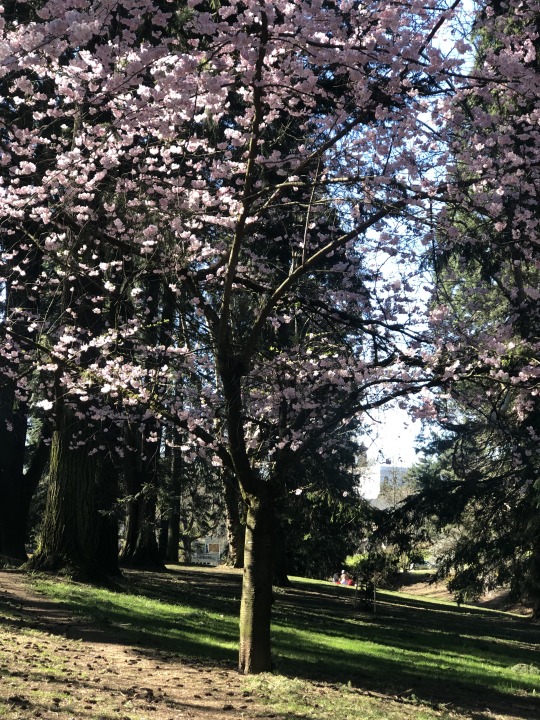
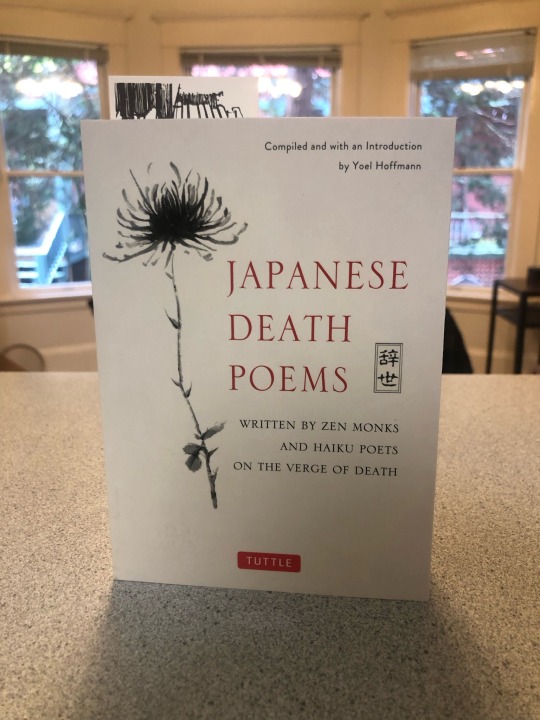
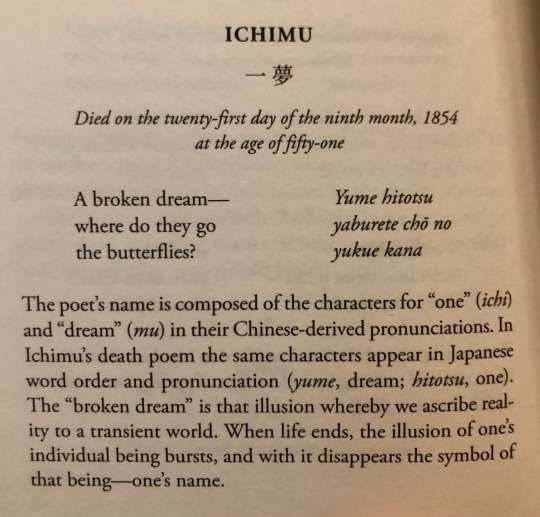
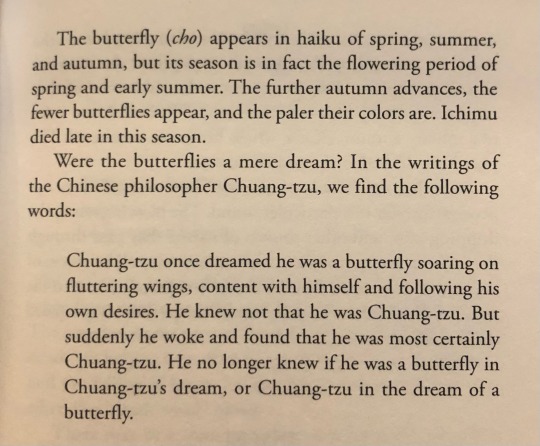
After I finished making a midterm exam, Molly and I went to a secret Japanese tea house. It appears on no map, has no hours, no sign. It is as though it exists, somehow, outside this world. When you enter, you give your phone to the owner to lock in a box for the duration of your visit.
We stayed for nearly 6 hours—sat reading poems, chatting with the eccentric owner about Sufism and the ocean and his peculiar flower arrangements consisting of a mix of living and dead plant matter.
How can I describe it, the strange sensation of being alive, late at night in those dim lights, surrounded by beauty. I got up to look at the wares, inhaled the hinoki essential oil—Max Richter was playing as I stared at blank notecards and imagined writing someone a heartfelt note, writing bravely, from that bewitched and emotionally authentic space I was in. I felt a sudden pang. It was the moment opening, with all its counterfactuals, what could have been, what will never be—how deeply I could feel, in that instant, the texture of my grief.
When I’m in the hustle and bustle of my busy and now quite ordinary life, I think, if only I could really hear the voice that says,
“Jackie, it was not for this that you were created.”
Then I would give away all my things and spend my days in prayer.
Susan Howe writes that for Sarah Edwards, “all works of God are a kind of language or voice to instruct us in things pertaining to calling and confusion.”
“...each soul comes upon the call of God in his word. I read words but don’t hear God in them.”
Did I pray, how long in supplication, with my inner eye fixed on that phantom, the phantom with her eyes stitched shut, limbs covered in oak moss. A dream of the opening of the eyes, the inert limbs now lithe and moving toward you. Ordinary objects and sounds are suddenly strange. That’s when the phantom slips through, when I hear the birds singing in a tree...
The blooming moment. Retrospectively, I am convinced that its condition of possibility was the confiscation of my phone, that it is only when we are unplugged that we can sense these holy emanations.
How calm we were, leafing through the book of Japanese death poems (jisei) in the tea house. What will be the last words I write before dying? For all I know, it could be this, or this. I remembered the dying words of George Mackay Brown: “I see hundreds and hundreds of ships sailing out of the harbour.” I remember the fragments Kafka wrote while dying, “lemonade everything was infinite,” his concern for the peony, the improvised performance—the incantation—I did at the Zinc Bar in 2015 using Kafka’s dying words, how J wept in the audience, then wrote me about the snow:
I am the guy, by the way, who said hi on the street, in the snow, after your reading. … I did indeed cry after your Kafka-Cixous incantation, partly because that phrase has been magic to me my whole life. I read Cixous' novel by that name when I studied with her and Derrida in my twenties... Her seminars were amazing. One day, funnily enough, she gave a seminar on snow in Proust, simply because snow was on the ground in Paris. For all sorts of reasons your whole reading shook and tenderised me deeply. I suppose, with the snow through the tinted glass outside, it will forever be, my imagination of what you read will forever be blanche niege texte.
(standing on the corner in manhattan with that powdery snow i was looking at the flowers when you walked past actually, turned, swivelled, i had needed to get out of the bar because the reading had touched me so much . . . i then went and wandered in the snow for an hour, till i happened on a subway, and back to my friend's in brooklyn . . . i have been thinking more today about how effective your reading was to me. it sort of made me feel i could only read poetry from now on if i was embodied, since what convinced in your reading beyond the obvious was the adjustments to us, the audience, the interruptions, the ability to break off, and then the actual concentration because of the embodiments . . . at most poetry readings i am constantly thinking 'i am at a poetry reading' and can't really get beyond the poem-as-poem-at-reading. when you read i was suddenly completely focused. the bodily resonation was right, a recuperation of grace, so i could listen. like before the internet or something. it returned me all the way to early cixous and feminine writing and what that could still mean, a writing beyond master-works and over-sociality of tact, agua viva, what korine might call 'mistakist' heaven. it was my first time in new york. my last night. stop. for now. cut the flowers.)
83 notes
·
View notes
